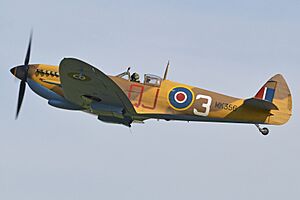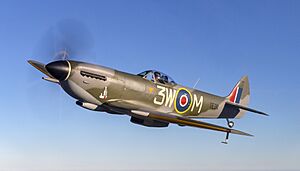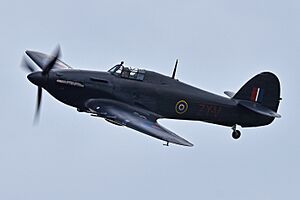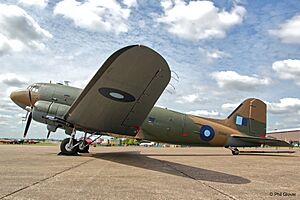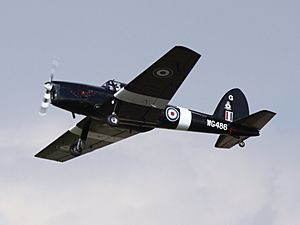Battle of Britain Memorial Flight facts for kids
Quick facts for kids Battle of Britain Memorial Flight |
|
|---|---|
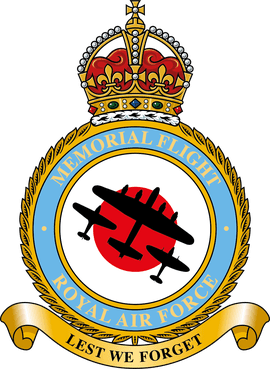
Battle of Britain Memorial Flight badge
|
|
| Active | 11 July 1957 – Present |
| Country | |
| Branch | |
| Type | Flying unit |
| Role | Historic aircraft display flight |
| Size | Twelve aircraft |
| Part of | No. 1 Group (Air Combat) |
| Home station | RAF Coningsby |
| Nickname(s) | BBMF |
| Patron | The Prince of Wales |
| Motto(s) | Lest We Forget |
| Commanders | |
| Officer Commanding | |
| Aircraft flown | |
| Bomber | Avro Lancaster B Mk. I |
| Fighter | Hawker Hurricane Mk. IIc Supermarine Spitfire Mk. IIa Supermarine Spitfire Mk. Vb Supermarine Spitfire LF Mk. IXe Supermarine Spitfire LF Mk. XVIe Supermarine Spitfire PR Mk. XIX |
| Trainer | de Havilland Canada Chipmunk T.10 |
| Transport | Douglas Dakota C Mk. III |
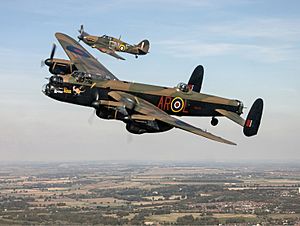
The Battle of Britain Memorial Flight (BBMF) is a special group of planes from the Royal Air Force (RAF). They fly old aircraft, like the famous Avro Lancaster bomber and speedy Supermarine Spitfire and Hawker Hurricane fighter planes. You can often see them at events that remember World War II and at important British celebrations. They also perform amazing air displays across the UK and Europe.
This flight is part of No. 1 Group (Air Combat) RAF. Their home base is RAF Coningsby in Lincolnshire, England.
Contents
Meet the Historic Aircraft
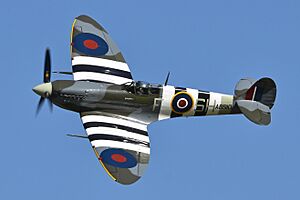
The BBMF usually flies with a Lancaster bomber and two fighters. But they actually have a total of 12 aircraft in their collection! These include:
- 1 Avro Lancaster bomber
- 6 Supermarine Spitfires
- 2 Hawker Hurricanes
- 1 Douglas Dakota transport plane
- 2 de Havilland Canada DHC-1 Chipmunk training planes
These aircraft have a rich history. They once served with the RAF, the United States Army Air Forces, and the Royal Canadian Air Force. Pilots from many countries, like Czechoslovakia, Poland, and Canada, flew them. Some of these planes were almost scrapped but were saved. One aircraft has even been flying with the RAF for almost 50 years!
The Speedy Spitfires
The BBMF has several Supermarine Spitfires, each with its own story.
- P7350 is the oldest Spitfire, a Mk.IIa. It flew in the famous Battle of Britain in 1940. In 2019, it was painted to look like the plane flown by pilot Alan Deere in 1940.
- AB910 is a Mk Vb Spitfire from 1941. It protected ships in the Battle of the Atlantic and flew during the Dieppe Raid. It also helped cover the Normandy beaches on D-Day in 1944. This plane now has special D-Day stripes.
- MK356 is a Mk LFIXe Spitfire built in 1944. It took part in fighter sweeps over France before D-Day. After the war, it was displayed as a gate guardian before being restored for the BBMF in 1992. Sadly, this aircraft crashed in May 2024, and its pilot was killed.
- PM631 and PS915 are two PRXIX Spitfires from 1945. PM631 was too late for World War II combat. It became part of the Historic Aircraft Flight in 1957 and is the longest-serving aircraft in the BBMF. PS915 flew reconnaissance missions in Germany. It later performed the last operational RAF Spitfire flight in 1954 over Malaysia.
- TE311 is a Mark XVI Spitfire from 1945. It joined the BBMF in 2007 and became airworthy in 2012. Since January 2024, it has been painted to honor No. 322 (Dutch) Squadron RAF. In July 2024, one side was repainted to remember Squadron Leader Mark Long, who died in the MK356 crash.
The Mighty Hurricanes
The BBMF has two Hawker Hurricanes.
- LF363 first flew in 1944 and was the last Hurricane to join the RAF. It has appeared in several movies and TV shows.
- PZ865 was built in July 1944 and is the very last Hurricane ever made. It joined the BBMF in 1972. It once had "The Last of the Many" written on its sides.
The Legendary Lancaster Bomber
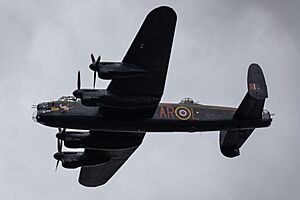
The Avro Lancaster bomber, PA474, joined the BBMF in 1973. It is one of only two airworthy Lancasters left in the world! It was finished in 1945, too late for World War II combat. This plane has also appeared in movies like Operation Crossbow and The Guns of Navarone.
PA474 often displays markings for its missions, like bombs for flights over Germany. It also releases poppies during special exhibition flights. In 2008, it flew with the restored Avro Vulcan XH558, creating an amazing display of two classic heavy aircraft.
The Versatile Dakota
The Douglas Dakota, ZA947, was built in 1942. It served with the US Army Air Forces and the Royal Canadian Air Force. It joined the BBMF in 1993. This plane has special 'para seats' and is used for commemorative parachute drops. While it used to be a support aircraft, it now also performs in air displays.
The Training Chipmunks
The two de Havilland Canada DHC-1 Chipmunks (WG486 and WK518) are the last of their kind in RAF service. They are not for public displays. Instead, they help pilots learn to fly aircraft with a tailwheel landing gear. This type of landing gear is very different from what modern RAF planes use. Chipmunk WG486 even flew reconnaissance missions over East Germany in the past.
Flypasts and Special Formations
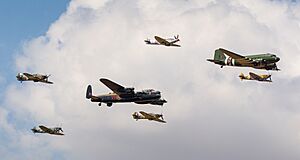
The BBMF often flies alongside other famous British aircraft, like the Red Arrows. They even flew with the Concorde before it stopped flying in 2003.
In 2014, another Lancaster bomber, FM213 from Canada, joined the BBMF for part of the display season. This Canadian Lancaster, known as "Vera," flew 3,000 miles to the UK. It displayed with PA474, marking the first time two Lancasters flew together in 50 years!
Current Aircraft in the Flight
| Model | Mark | Registration | Built | Joined BBMF | Status | Notes | Refs |
|---|---|---|---|---|---|---|---|
| Avro Lancaster | B Mk. I (B.I) | PA474 | 31 May 1945 | November 1973 | Airworthy | ||
| Supermarine Spitfire | Mk. Vb | AB910 | July 1941 | September 1965 | Maintenance | Planned maintenance since October 2023. Return estimated July 2024. | |
| Supermarine Spitfire | LF Mk. IXe | MK356 | 1944 | November 1997 | Damaged/destroyed | Fatal crash in May 2024. | |
| Supermarine Spitfire | Mk. IIa | P7350 | 1940 | 5 November 1968 | Airworthy | ||
| Supermarine Spitfire | PR Mk. XIX | PM631 | 1945 | 11 July 1957 | Maintenance | Planned maintenance in progress. Unlikely to return until 2025. | |
| Supermarine Spitfire | PR Mk. XIX | PS915 | 1945 | 11 July 1957 | Maintenance | Under maintenance since July 2018. Return estimated 2024. | |
| Supermarine Spitfire | LF Mk. XVIe | TE311 | 1945 | January 2000 | Airworthy | ||
| Hawker Hurricane | Mk. IIc | LF363 | 1 January 1944 (first flew) | July 1957 | Airworthy | ||
| Hawker Hurricane | Mk. IIc | PZ865 | July 1944 | March 1972 | Airworthy | ||
| Douglas Dakota | Mk. III (C-47A) | ZA947 | March 1942 | March 1993 | Maintenance | Planned maintenance since October 2022. Return estimated April 2025 in a new SAEC scheme. | |
| de Havilland Canada DHC-1 Chipmunk | T.10 | WK518 | January 1952 (entered service) | April 1983 | Airworthy | ||
| de Havilland Canada DHC-1 Chipmunk | T.10 | WG486 | January 1952 (entered service) | 1995 | Airworthy |
The History of the Flight
The idea for the BBMF started after World War II. A Spitfire and Hurricane would lead the Victory Day flypast over London. This led to the creation of a collection of flying historic aircraft. Their goal was to remember the RAF's role in the Battle of Britain and other World War II campaigns.
Early Days: Biggin Hill and Coltishall
The Historic Aircraft Flight began in July 1957 at RAF Biggin Hill. It had one Hurricane and three Spitfires. Even then, most air forces were using jet planes, making these old planes very special.
In April 1963, the flight moved to RAF Coltishall in Norfolk. It was first called the Historic Flight, then the Battle of Britain Flight. When the Lancaster bomber joined in 1973, it became the Battle of Britain Memorial Flight, the name it still uses today. At Coltishall, the flight became a proper unit with its own dedicated team.
Finding a Permanent Home at Coningsby
The BBMF moved to its current home at RAF Coningsby in 1976. Since then, they have added more aircraft. A Chipmunk joined in 1983, and a Dakota arrived in 1995. The Dakota was first used for training but now plays a bigger role in displays. Over the years, some Spitfires and Hurricanes have been added, while others have gone to museums or been used for parts.
The BBMF has been based at several RAF stations over the years. These include RAF Biggin Hill, RAF North Weald, RAF Martlesham Heath, RAF Horsham St Faith, RAF Coltishall, and finally RAF Coningsby since 1976.
Visit the BBMF Centre
The Battle of Britain Memorial Flight Visitor Centre is at RAF Coningsby in Coningsby, Lincolnshire. Here, you can take a guided tour to see the aircraft up close when they are not flying. The centre also has exhibits about the planes and their history. Princess Margaret, Countess of Snowdon opened the visitor centre on June 30, 1987.
Important Incidents and Accidents
The BBMF aircraft are old and sometimes face challenges.
- September 11, 1991: Hurricane LF363 had an engine problem while flying to Jersey. The pilot, Squadron Leader Allan Martin, made an emergency landing at RAF Wittering. The engine failed completely, and the plane crashed onto the runway. The pilot escaped with a broken ankle and minor burns. The aircraft was badly damaged but was rebuilt over four years. To help pay for the repairs, a Spitfire (PS853) was sold. LF363 flew again in 1998 and is still with the BBMF.
- May 7, 2015: Lancaster PA474 had a fire in one of its engines during a training flight. The pilot safely landed the plane with the other three engines. The aircraft was grounded for most of 2015 while engineers replaced the damaged engine. It flew again in October 2015.
- July 25, 2015: Hurricane LF363 had an oil leak during a flypast. The pilot, Squadron Leader Mark Discombe, flew the plane back to Coningsby and made a safe emergency landing, even with limited visibility. He received an award for his brave actions.
- May 11, 2022: Spitfire MK356 had a faulty brake during landing at RAF Coningsby. The pilot, Flight Lieutenant Andy Preece, managed to keep the plane on the runway and stop it safely. He received a special award for his excellent handling of the situation.
- May 25, 2024: Sadly, Spitfire MK356 crashed shortly after takeoff near RAF Coningsby. The pilot, Squadron Leader Mark Long, was killed in the accident. He had been a pilot with the team for four years. After this tragic event, the RAF temporarily grounded all BBMF aircraft to investigate the crash. The visitor centre reopened in June 2024, and the Lancaster PA474 was cleared to fly again in August 2024. However, the Spitfires and Hurricanes remained grounded while investigations continued. To honor Squadron Leader Mark Long, Spitfire TE311 was repainted in July 2024 with a special code and his name. A fundraiser was also set up to support his family and create a flying scholarship in his name.
See also
- Historic Army Aircraft Flight, Stockbridge, Hampshire, UK
- Royal Navy Historic Flight (defunct)
- Air Force Heritage Flight of New Zealand
- No. 100 Squadron RAAF
 | Delilah Pierce |
 | Gordon Parks |
 | Augusta Savage |
 | Charles Ethan Porter |


